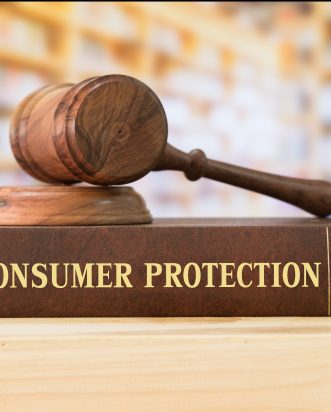Consumer protection laws are designed to protect consumers from deceptive practices and products. These laws help to keep sellers honest and to protect purchases of goods from fraudulent or deceptive marketing. Consumer protection laws are enforced by the Federal Trade Commission, and businesses that fail to maintain compliance with federal consumer protection laws could face severe consequences. At Bates Group, our team of experienced consultants can provide consumer protection law compliance assistance. Call us today to learn more.
What Are Consumer Protection Laws?
The Bureau of Consumer Protection with the Federal Trade Commission (FTC) is responsible for stopping unfair, fraudulent, and deceptive business practices that negatively impact consumers. Consumer protection laws are varied and multiple, ranging from laws about robocalls, scams, fraud, deceptive advertising, credit reporting, environmental claims, and much, much more.
Key Consumer Protection Laws
While there are dozens of laws that are designed to protect consumers, there are three that stand out as especially important:
- Federal Securities Act. The Federal Securities Act was the first piece of legislation passed that was designed to regulate the stock market. There are two primary goals of the legislation: First, to ensure that businesses cannot engage in misrepresentation and fraudulent activities in the securities market, and second, to improve transparency and informed decision-making around investments. Today, investors are entitled to receive financial information regarding securities that are offered for public sale. A breach of the securities act can lead to large fines and even prison time.
- Fair Credit Reporting Act. The Fair Credit Reporting Act, or FCRA, regulates the way in which credit reporting agencies can collect, share, and use consumer report data. The FCRA gives consumers the right to know when their data is used to deny a loan or line of credit, provides access to one’s own credit report, restricts others’ access to one’s credit report, and more.
- Dodd-Frank Act. Officially called the Dodd-Frank Wall Street Reform and Consumer Protection Act, the Dodd-Frank Act arose out of the 2008 financial crisis. The act reorganized the financial regulatory system, created new agencies, restricted the emergency lending power of the Federal Reserve, and put in place regulations to prohibit lending companies from taking advantage of consumers.
Consumer Protection Compliance Assistance from Bates Group
Consumer protection compliance is an essential part of how your business is managed and operated. If a business fails to comply with consumer protection laws, it could face severe consequences. At Bates Group, our consumer protection compliance consultants can help. Reach out to our team today for the services and expertise you can count on.



